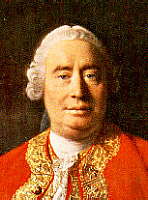
David Hume (7 May 1711 NS (26 April 1711 OS) – 25 August 1776) (born David Home) was a Scottish philosopher, historian, economist, and essayist, who is best known today for his highly influential system of radical philosophical empiricism, skepticism, and naturalism.
Hume's empiricist approach to philosophy places him with John Locke, George Berkeley, Francis Bacon, and Thomas Hobbes as a British Empiricist. Beginning with his A Treatise of Human Nature (1739), Hume strove to create a total naturalistic science of man that examined the psychological basis of human nature. Against philosophical rationalists, Hume held that passion rather than reason governs human behaviour and argued against the existence of innate ideas, positing that all human knowledge is ultimately founded solely in Experience; Hume thus held that genuine knowledge must either be directly traceable to objects perceived in experience, or result from abstract reasoning about relations between ideas which are derived from experience, calling the rest "nothing but sophistry and illusion", a dichotomy later given the name Hume's fork. In what is sometimes referred to as Hume's problem of induction, he argued that inductive reasoning, and belief in causality, cannot, ultimately, be justified rationally; our trust in causality and induction instead results from custom and mental habit, and are attributable to only the experience of "constant conjunction" rather than logic: for we can never, in experience, perceive that one event causes another, but only that the two are always conjoined, and to draw any inductive causal inferences from past experience first requires the presupposition that the future will be like the past, a presupposition which cannot be grounded in prior experience without already being presupposed. Hume's anti-teleological opposition to the argument for God's existence from design is generally regarded as the most intellectually significant such attempt to rebut the Teleological Argument prior to Darwin.
Hume was also a sentimentalist who held that ethics are based on emotion or sentiment rather than abstract moral principle, famously proclaiming that "Reason Is and Ought Only to Be the Slave of the Passions". Some contemporary scholars view Hume's moral theory as a unique attempt to synthesize the modern sentimentalist moral tradition to which Hume belonged, with the virtue ethics tradition of ancient philosophy, with which Hume concurred in regarding traits of character, rather than acts or their consequences, as ultimately the proper objects of moral evaluation. Hume's moral theory maintained an early commitment to naturalistic explanations of moral phenomena, and is usually taken to have first clearly expounded the is–ought problem, or the idea that a statement of fact alone can never give rise to a normative conclusion of what ought to be done. Hume also influentially denied that humans have an actual conception of the self, positing that we experience only a bundle of sensations, and that the self is nothing more than this bundle of causally-connected perceptions. Hume's compatibilist theory of free will takes causal determinism as fully compatible with human freedom, and has proved extremely influential on subsequent moral philosophy.[6]
While Hume was derailed in his attempts to start a university career by protests over his "atheism," and bemoaned that his literary debut, A Treatise of Human Nature 'fell dead-born from the press', Hume nevertheless found literary success in his lifetime as an essayist, and a career as a librarian at the University of Edinburgh. His tenure there, and the access to research materials it provided, ultimately resulted in Hume's writing the massive six-volume The History of England, which became a bestseller and the standard history of England in its day. Hume described his "love for literary fame" as his "ruling passion" and judged his two late works, the so-called "first" and "second" enquiries, An Enquiry Concerning Human Understanding and An Enquiry Concerning the Principles of Morals, respectively, as his greatest literary and philosophical achievements, asking his contemporaries to judge him on the merits of the later texts alone, rather than the more radical formulations of his early, youthful work, dismissing his philosophical debut as juvenilia: "A work which the Author had projected before he left College."[9] Nevertheless, despite Hume's protestations, a general consensus exists today that Hume's strongest and most important arguments, and most philosophically distinctive doctrines, are found in the original form they take in the Treatise, begun when Hume was just 23 years old, and now regarded as one of the most important works in the history of Western Philosophy.
Hume has proved extremely influential on subsequent Western thought, especially on utilitarianism, logical positivism, William James, Immanuel Kant, the philosophy of science, early analytic philosophy, cognitive science, theology and other movements and thinkers. Kant himself famously credited Hume as the spur to his philosophical thought who had awakened him from his "dogmatic slumbers;" contemporary philosophers have opined that "Hume, rivaled only by Darwin, [who] has done the most to undermine in principle our confidence in arguments from design;" that "No man has influenced the history of philosophy to a deeper or more disturbing degree, and that Hume's Treatise is "the founding document of Cognitive Science" and the "most important philosophical work written in English"; no less a philosophical authority than Arthur Schopenhauer once declared that "there is more to be learned from each page of David Hume than from the collected philosophical works of Hegel, Herbart and Schleiermacher taken together." Hume is thus widely regarded as a pivotal figure in the history of philosophical thought.
https://en.wikipedia.org/wiki/David_Hume
Geen opmerkingen:
Een reactie posten